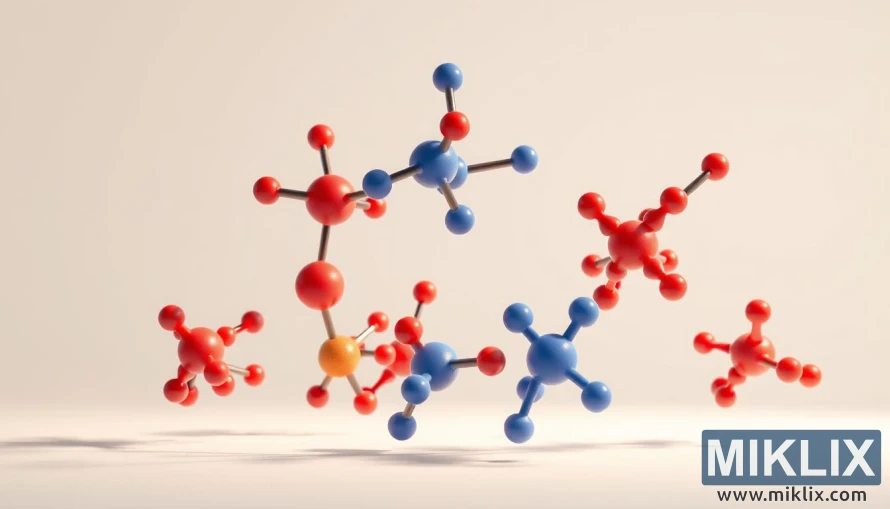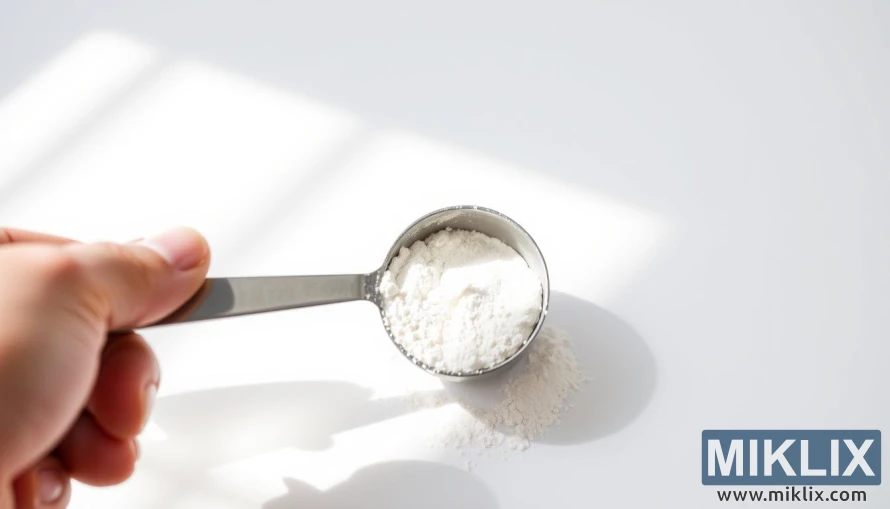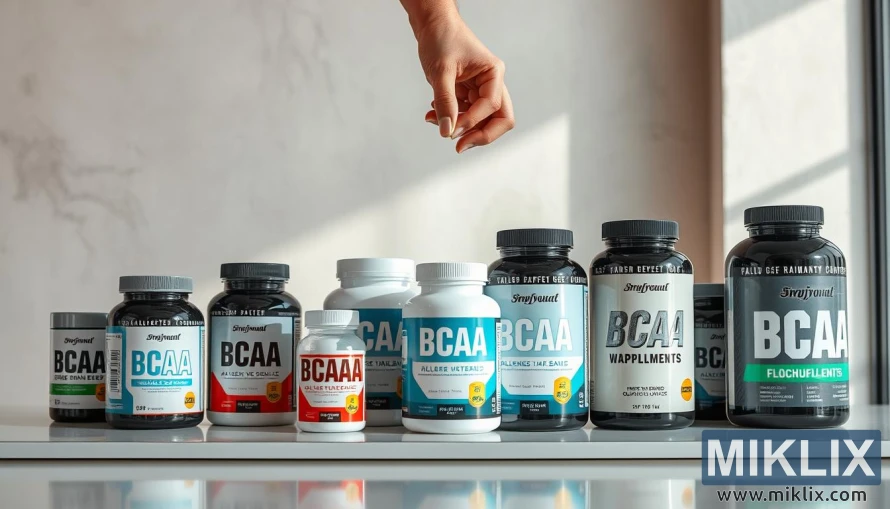BCAA Breakdown: The Essential Supplement for Muscle Recovery and Performance
Published: July 2, 2025 at 12:30:37 PM UTC
Branched Chain Amino Acids, or BCAAs, are vital nutrients for muscle recovery and exercise performance. Adding BCAA supplements to a fitness routine can boost physical health. It promotes muscle growth, reduces soreness, and supports liver health. As athletes and fitness enthusiasts learn about BCAA benefits, these supplements are gaining popularity. Knowing the importance of BCAAs can help improve workout results and overall wellness.

Key Takeaways
- BCAAs are essential for muscle recovery and growth.
- Supplementing with BCAAs can reduce exercise-induced muscle soreness.
- BCAAs may improve exercise performance by decreasing fatigue.
- Branched Chain Amino Acids can aid liver health.
- Understanding safe dosing is key to maximizing BCAA benefits.
- A variety of dietary sources provide BCAAs beyond supplements.
Introduction to Branched Chain Amino Acids (BCAA)
Branched Chain Amino Acids, or BCAAs, are key to muscle metabolism and recovery. This amino acid overview highlights three critical amino acids: leucine, isoleucine, and valine. These nutrients are essential for athletes and fitness enthusiasts. They boost energy during exercise and aid in recovery afterward.
BCAAs are a common component in fitness supplements due to their benefits. They support muscle repair and reduce muscle soreness and fatigue. Recognizing the importance of BCAAs can significantly improve performance and workout outcomes.
What Are Branched Chain Amino Acids?
Branched Chain Amino Acids, commonly known as BCAAs, consist of three essential amino acids: leucine, isoleucine, and valine. These amino acids are vital for muscle protein synthesis and energy production during exercise. Unlike other amino acids, BCAAs cannot be produced by the body. They must be obtained from dietary sources, making them essential nutrients.
The unique chemical structure of BCAAs distinguishes them from other amino acids. Their branched side chains give them the name “branched chain.” This structure enables them to be directly metabolized in muscles. This process significantly aids in muscle recovery and enhances exercise performance.
Importance of Essential Amino Acids
Essential amino acids are critical for our health, playing a key role in muscle function and recovery. Unlike non-essential amino acids, which our bodies can synthesize, essential amino acids must come from our diet or supplements. This underlines their importance in supporting our bodily functions.
The significance of BCAAs, which include leucine, isoleucine, and valine, cannot be overstated. These amino acids directly contribute to protein synthesis, a vital process for muscle health and growth. By activating specific pathways, BCAAs help repair muscle tissue after exercise.
Ensuring adequate essential amino acids in your diet can boost muscle function. It reduces fatigue during workouts and speeds up recovery. For athletes and fitness enthusiasts, consuming BCAA-rich foods or supplements is an effective strategy. It helps enhance performance and maintain muscle health.

Muscle Growth: A Key Benefit of BCAAs
BCAAs play a vital role in muscle growth. These essential amino acids, with leucine at the forefront, kickstart protein synthesis. This makes them a cornerstone in fitness supplementation. Studies confirm that BCAAs boost muscle mass when taken after exercise.
The journey to muscle growth starts with the mTOR pathway activation. Leucine is the catalyst, sparking increased protein synthesis and muscle recovery. Research highlights BCAAs' role in muscle growth, showing they enhance muscle mass and strength in users.
Adding BCAAs to a workout routine can significantly improve outcomes, vital for intense training or bodybuilding. They are a key part of a well-rounded fitness supplementation strategy. BCAAs provide the body with the necessary tools to build and repair muscle effectively.
Decrease Muscle Soreness with BCAAs
Incorporating BCAAs into your post-workout routine can significantly aid in diminishing muscle soreness. These essential amino acids play a critical role in facilitating muscle recovery after intense exercise. When engaging in vigorous activities, the body experiences muscle breakdown, leading to delays in recovery due to delayed onset muscle soreness (DOMS).
Research indicates that BCAAs reduce soreness by minimizing protein breakdown and mitigating muscle damage. This effect is highly beneficial when facing DOMS, often experienced after new or extreme workouts. By decreasing fatigue and promoting quicker muscle recovery, BCAAs become an essential supplement for athletes and fitness enthusiasts looking to maintain optimal performance levels.
Using BCAAs can result in:
- Reduced levels of muscle soreness post-exercise
- Shorter recovery time between workouts
- Enhanced performance during subsequent training sessions
Overall, integrating BCAAs into your fitness regimen may lead to improved muscle recovery and less discomfort following strenuous workouts.
Reduce Exercise Fatigue through BCAA Supplementation
Branched Chain Amino Acids (BCAAs) are key in combating exercise-induced fatigue. When we engage in long workouts, our BCAA levels drop. This decrease triggers an increase in serotonin, which makes us feel tired. Using BCAAs can help prevent this fatigue.
Research shows that BCAAs can:
- Keep energy levels up during exercise.
- Reduce the feeling of exhaustion.
- Boost stamina and endurance during workouts.
Adding BCAAs to your workout routine can significantly reduce fatigue. It helps athletes and fitness enthusiasts to overcome their limits. This way, they can have more productive and effective training sessions.
Prevent Muscle Wasting: How BCAAs Help
Muscle wasting prevention is a critical concern, mainly for those facing malnutrition or serious health issues. BCAAs play a vital role in this area, supporting muscle integrity. These amino acids, including leucine, isoleucine, and valine, balance muscle protein synthesis and breakdown.
Research shows that maintaining protein balance is key for those at risk of muscle wasting. This includes older adults and those with certain illnesses. Studies indicate that BCAAs can stimulate muscle protein synthesis and reduce breakdown. This leads to better outcomes for these groups. Adding BCAAs to one's diet or supplements can help prevent muscle wasting and preserve muscle health.
Benefits of BCAAs for Liver Health
BCAAs are vital for liver health, mainly for those with cirrhosis. Studies indicate that BCAA supplements can improve outcomes in patients with hepatic encephalopathy. This condition arises from liver dysfunction. BCAAs also show promise in preventing hepatocellular carcinoma.
Cirrhosis, often caused by chronic alcohol use or hepatitis, disrupts metabolism. BCAAs can help by providing essential nutrients, aiding in metabolic balance. They also boost protein metabolism, critical for liver disease patients.
BCAAs support cellular regeneration and enhance liver function. Their benefits could be a key nutritional strategy for severe liver conditions. Recognizing BCAAs' role in liver health may lead to better treatments and prevention for liver diseases.
Sources of Branched Chain Amino Acids (BCAA)
Branched Chain Amino Acids (BCAAs) play a vital role in our bodies. They are essential for various functions. Getting them from food is key to maintaining health. Many can get enough BCAAs from protein in everyday foods.
Complete protein sources like meat, eggs, and dairy are very beneficial. They offer BCAAs and all essential amino acids our bodies need. Here are some top dietary sources of BCAAs:
- Chicken breast
- Beef
- Fish
- Eggs
- Greek yogurt
- Milk
- Whey protein
There are also plant-based options for BCAAs:
- Lentils
- Chickpeas
- Quinoa
- Pea protein
- Brown rice
Combining these BCAA-rich foods can boost nutritional value. It supports muscle growth and recovery. Most people can meet their BCAA needs with a balanced diet rich in protein.

Potential Risks and Side Effects of BCAA Supplements
BCAA supplements are widely used by fitness enthusiasts, but it's vital to know about possible side effects. Common issues include gastrointestinal problems like bloating, diarrhea, and nausea. Some may also see changes in blood glucose levels, which is a concern for those with diabetes.
Improper use or taking too much can increase the risks. High levels of branched-chain amino acids can upset the balance of amino acids. This imbalance can affect metabolism and overall health. It's wise for individuals to talk to healthcare providers before starting BCAA supplements. This is even more important for pregnant women or those with health conditions.
It's essential to watch how your body reacts to BCAA supplements. Not everyone will experience negative effects. But knowing about possible side effects helps make better choices about using them.
Interactions with Other Medications and Conditions
Branched Chain Amino Acids (BCAAs) are essential for muscle recovery and overall health. Yet, it's important to be aware of possible BCAAs drug interactions. People taking certain medications or managing health conditions should know how these supplements might affect their health.
Seeking advice from healthcare professionals is vital for medication safety. This is true for those on medications that alter amino acid metabolism. This includes those with diabetes or needing to adjust their protein intake. Also, individuals with neurological health conditions should consider how BCAAs might affect their treatment.
Health conditions like liver disease or kidney disorders can impact amino acid processing. For these individuals, adding BCAAs without professional guidance can be risky. It's important to monitor both dosage and effects. This ensures that supplementation meets personal health goals without causing complications.
How to Properly Dose BCAA Supplements
Finding the right BCAA dosage is key to getting the most out of supplements. Your goals, how hard you exercise, and what you eat all play a part. They affect how well you use BCAAs.
Guidelines suggest taking 5 to 20 grams a day, based on your needs. Research backs up specific dosing for best results:
- For muscle recovery: 5-10 grams post-workout.
- For muscle growth: 10-20 grams spread out during the day, before or during workouts.
- For athletic performance: 5 grams before exercise, then 5 grams after.
Following these guidelines can enhance BCAA benefits and reduce risks of too much. It's important to watch how your body reacts and adjust your dosage if needed. This ensures you get the most out of your BCAA supplements.

Alternative Ways to Incorporate BCAAs into Your Diet
For those looking to increase BCAA intake through food, choosing specific BCAA foods is key. These should be complete protein sources, providing all essential amino acids. Examples include:
- Lean meats like chicken and turkey
- Fish, such as salmon and tuna
- Dairy products, like Greek yogurt and cottage cheese
- Eggs, which are both versatile and nutrient-rich
- Legumes like lentils and chickpeas for plant-based options
Exploring different dietary strategies can boost BCAA intake. Opting for whole foods supports muscle recovery and growth. It also ensures a balanced nutrient intake. Adding these foods to your meals can fulfill daily BCAA needs, eliminating the need for supplements.
Who Should Consider BCAA Supplements?
BCAA supplements are highly beneficial for several groups aiming to boost their physical performance and recovery. These include athletes, bodybuilders, vegetarians, and older adults. Each group can gain unique benefits from adding BCAAs to their diet.
Athletes in intense training can benefit from BCAAs to reduce muscle soreness and fatigue. Bodybuilders use them to support muscle growth and speed up recovery. Vegetarians, lacking enough amino acids from their diet, find BCAAs essential for muscle health. Older adults benefit from BCAAs in preserving muscle mass and overall health as they age.
Understanding these groups highlights the value of BCAA supplements in their fitness and wellness routines.
Finding the Right BCAA Supplement for Your Needs
When selecting BCAA supplements, it's vital to examine the various options available. The market is flooded with products, each with unique formulations and benefits. Start by looking at the ingredient transparency of each supplement. Brands that openly share their ingredient lists and sourcing methods usually offer high-quality BCAAs.
The BCAA ratio is also a key consideration. The most common ratio is 2:1:1, which stands for leucine, isoleucine, and valine. Some people might find different ratios more beneficial for their specific goals.

Also, check for any additional ingredients. Some supplements include vitamins, electrolytes, or natural flavorings, which can boost their benefits. Opt for products that focus on purity, as this can greatly affect their effectiveness.
By carefully evaluating these factors, individuals can make choices that meet their health and performance goals. Finding the right BCAAs might involve some research, but the correct choice can greatly enhance fitness or recovery outcomes.
Conclusion
In summary, branched-chain amino acids (BCAAs) are essential for muscle growth, reducing fatigue during exercise, and aiding recovery. These benefits make BCAA supplements attractive to athletes and fitness enthusiasts. They aim to boost performance and maintain health. The role of BCAAs in muscle protein synthesis and reducing muscle soreness is vital.
When considering supplements, it's key to be thoughtful. While whole foods like meat, dairy, and legumes provide BCAAs naturally, supplements can be a convenient option in certain situations. It's important to make informed choices based on individual needs and dietary preferences.
Whether choosing whole foods or BCAA supplements, ensuring adequate intake is critical for your fitness journey and health. Evaluate your personal goals and lifestyle when adding BCAAs to your routine. This approach leads to more effective training and recovery outcomes.
Further Reading
If you enjoyed this post, you may also like these suggestions:
- Why Raspberries Are a Superfood: Boost Your Health One Berry at a Time
- Gut Feeling: Why Sauerkraut Is a Superfood for Your Digestive Health
- From Potassium to Prebiotics: The Banana's Hidden Health Boosters
